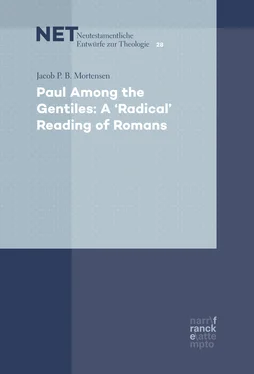Donaldson points out a final difficulty with the radical perspective, which concerns the identity of the members of Paul’s assemblies. According to Donaldson, the ‘radicals’ argue that the Christ-believing Gentiles should not become Jews by way of circumcision. But they are still considered Abraham’s seed (cf. Gal 3:29; Rom 4:13–18). According to Donaldson, these two identities are irreconcilable, since ‘seed’ was used specifically with reference to Jews, in contrast to Gentiles.3 Thus, Donaldson maintains a contrast between two mutually exclusive alternatives. And he further asks for evidence that argues that Paul would combine these two mutually exclusive alternatives. However, to this critique from Donaldson should be added the answer that Paul actually made that exact argument in Gal 3 (by citation in v. 8) and, differently, in Romans 3 to 4. And Paul also argued that the Gentiles were the seed of Abraham because they were ‘in Christ’, who is ‘the seed’ of Abraham that was promised (Gal 3:16; Gal 3:1–4:7, 28). So even if Donaldson’s criticism is worth considering, it does not really question the radical perspective.
Alexander Wedderburn also criticizes the radical perspective’s proposals. In a 2004 article, Wedderburn asks whether we should start speaking of a ‘newer perspective on Paul’ (‘einer neueren Paulusperspektive’) led by John Gager (and others), as in certain works, Gager and his gang move beyond (‘hinaus geht’) what Sanders proposed in Paul and Palestinian Judaism .4 Wedderburn explains that Gager (and others) present a two-covenant solution, with salvation for Jews through the ‘traditional’ covenant between God and Israel, and salvation for Gentiles in Christ. He also notes that Gager (and others) discount Paul’s criticism of the (Mosaic) law as relevant to Jews, and that Paul’s criticism of the law merely applies to Gentiles wanting to come under the law. In the article, Wedderburn sets out to identify difficulties in the new perspective, and how the ‘newer perspective’ addresses these difficulties. Finally, he presents his own considerations concerning this constellation.
Wedderburn turns to the radical perspective by explaining John Gager’s position. Gager maintains that Paul still considered the Jews committed or obligated to the (Mosaic) law after the coming of Christ. Paul did not change his attitude to Israel’s (or his own) obligation to the law; he changed his perception of the Gentiles’ obligation to the (Mosaic) law. So Paul’s criticism of the (Mosaic) law did not concern Israel (and himself). It merely concerned the Gentiles’ relation to the (Mosaic) law. This also has consequences for justification: The Jews may safely stick to the Torah, whereas Gentiles are incorporated to Israel through faith in Christ. Both will end up the same place, they merely take different roads.5
After outlining Gager’s position, Wedderburn turns to some critical remarks. First, he points out that Paul’s mission strategy (1 Cor 9:19–23) of becoming all things to all people does not fit with being a loyal and law-abiding Jew. It is untrustworthy of Paul to claim to be a law-abiding Jew, if he can be all things to all people and, thereby, not follow the (Mosaic) law. If you abide by the law, you abide to the law, and do not change sides (like a chameleon).6 This holds for Paul, and for all other Jews. And this brings Wedderburn to the next difficulty: Paul was not merely apostle to the Gentiles, since Aquila (Acts 18:2), Crispus (1 Cor 1:14) and several of the addressees in Rom 16 were Jews. And Wedderburn considers it unconvincing that Jews and Gentiles in the same assembly would live by different rules – some law-abiding, and some not.7 Furthermore, if Jews and Gentiles lived different lives within the same assembly, they would have no concrete expression of faith in common.
Wedderburn asks whether Paul spoke meaningfully, or merely gave hints about the (Mosaic) law, if he addressed his gospel exclusively to Gentiles. He asks whether Christ-believing Jews could obtain justification through the law. If Christ-believing Jews could obtain justification through the law, would it then imply that Christ died in vain (for Jews)? And if that was the case, why would Gentiles not also seek to obtain justification through the law as proselytes? And if proselytes could obtain justification through the law, then why does Paul state that no law could bring life (Gal 3:21)? Wedderburn concludes that only because the law is inadequate for both Jews and Gentiles does Gal 3:21 make sense. He further explains that there are both strengths and weaknesses in the traditional perspective, the new perspective, and the radical perspective. And in some cases, the arguments of the traditional perspective are stronger, and in other cases they are not.8 Even though Wedderburn’s remarks are weighty, they may be fully countered by within the radical perspective. I will address them below, and in subsequent chapters.
Following the description outlined above, it is time for me to sketch out the contours of my own approach, and explain how it extends and differs from those of the abovementioned scholars. First, it must be stated that I am merely presenting a possible reading of Romans, albeit inspired by the radical perspective. This reading of mine merely searches out the possibilities and limits of such a radical reading. Hence, I will use insights from the radical perspective as a lens through which I focus my own interpretation of Romans. I have chosen this point of departure because of the cogency the radicals show, and the consequence with which they present their interpretation with regard to Paul’s Jewish background and his address to Gentiles. These are the two major driving forces behind my interpretation: 1) Paul was thoroughly Jewish (as in ‘not Christian’) and 2) he addressed his message exclusively to Gentiles.
I develop my interpretation through a fruitful and productive conversation with the radical perspective, but in no way do I claim to subscribe to the overall view. I will allow weaknesses in my interpretation to appear as weaknesses, because I am not fanatical about my point of departure in the radical perspective. I have no stake in the radicals’ ‘Paul within Judaism’ project, and I have no intention of defending it as a religious claim. My project is simply historical-critical and philological, and I do not enter into discussions of contemporary ideology. I wish to explore the mindset, values, and category formations of the ancients – how they understood the phenomena their world presented to them. My interpretation includes no ethical claim or evaluation concerning contemporary ideological positions, as is found in the work of scholars such as Lloyd Gaston and Pamela Eisenbaum.1 I offer no evaluation of Christian anti-Judaism or anti-Semitism, as is found in the work of Paula Fredriksen and John Gager.2 I have no intention of arguing for a specific religious point (à la religious pluralism), and I am not engaged in any modern dialogue between Christianity and Judaism. In some of the radical scholars’ work, I can see and identify an idea of contemporary ‘religion’ as providing different but equally valid ‘paths to salvation’ which may also be identified in Paul. But I have no intention of unifying these two areas in my present interpretation of Romans. I intend to approach Paul from the perspective of historical-critical scholarship, since my aim is to better understand Paul from a historical and a philological perspective.
This said, I wish to make a case for not being simplistic when dealing with interpretative and textual problems. A disagreement over the interpretation of one or two verses should not lead to objections, if the overall interpretation explains more than previous interpretations have done. Although the devil is in the details, we will never understand the parts if we do not understand the whole, and vice versa. Part and whole must complement each other, and in the end, the one interpretation that explains more, more comprehensively, is preferable. There are problems with all interpretations, but they should be dealt with, and localized within the broader interpretive framework.
Читать дальше












